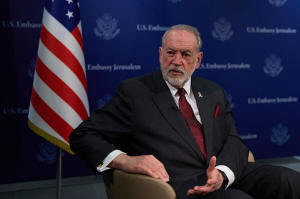Huckabee blames Europe for stalled Gaza talks, highlighting a growing
Western divide
[August 21, 2025]
By SAM MEDNICK
JERUSALEM (AP) — U.S. Ambassador to Israel Mike Huckabee sought
Wednesday to blame a recent breakdown in Gaza ceasefire talks on the
decision by some European leaders to recognize Palestinian statehood.
Talks over a lasting ceasefire have repeatedly stalled since the early
months of the war sparked by Hamas’ Oct. 7, 2023, attack — and long
before there was any talk of major European states recognizing
Palestinian statehood.
The decisions were announced by France, Britain and other countries
after the Trump administration’s Mideast envoy had already walked away
in frustration from the negotiations, which happened behind closed
doors. It's unclear how and when they began to break down.
But Huckabee's remarks in an interview with The Associated Press point
to a sharp divide among Western nations about how to approach the
Israeli-Palestinian conflict, and the rift has only deepened since
President Donald Trump took office.
Many European countries have sought to pressure Israel — the stronger
party — and frame the pursuit of a two-state solution as a way to
address the root causes of a conflict that long predates the war in
Gaza. But the Trump administration has given Israel wide latitude to end
the war on its terms.
A dispute over which side should be pressured
The White House fully supported Israeli Prime Minister Benjamin
Netanyahu’s decision to end an earlier ceasefire that Trump had helped
broker and resume wide-ranging military operations, during which Israel
prevented food, medicine and other goods from entering Gaza for more
than two months.

Trump appears to have adopted Israel’s position that further military
pressure — including a planned offensive into some of the most densely
populated areas of Gaza — will force Hamas to surrender.
“We will only see the return of the remaining hostages when Hamas is
confronted and destroyed!!!” Trump posted this week on his Truth Social
site.
Meanwhile, France, Britain and more than two dozen other Western-aligned
nations have expressed mounting outrage at Israel’s actions, demanding
that it halt the fighting and do more to facilitate humanitarian aid.
The moves to recognize Palestinians statehood — which were largely
symbolic — were in part aimed at pressuring Israel to halt its
offensive.
Britain explicitly linked the two, saying it would hold off on
recognizing a Palestinian state if Israel agreed to a ceasefire in Gaza,
stopped building settlements in the West Bank and committed to a
two-state solution.
Israel's current government and most of its political class were opposed
to Palestinian statehood even before the war, and they now say it would
reward Hamas and allow the militants to eventually carry out more Oct.
7-style attacks.
‘A counterproductive effect’
Huckabee, who is himself a longtime opponent of Palestinian statehood,
said the “noise that has been made by European leaders recently ... is
having the counterproductive effect that they probably think that they
want."
[to top of second column]
|

U.S. Ambassador to Israel Mike Huckabee is seen during an interview
in Jerusalem, Wednesday, Aug. 20, 2025. (AP Photo/Ohad Zwigenberg)

“If they believe that unilaterally calling for a two-state, a
Palestinian state recognition, immediately brings them closer, the
sad truth is it’s taking them further away,” he said.
The AP sought comment from the foreign ministries of France and
Britain, which did not immediately respond.
Most Palestinians believe the decades-old conflict is rooted in
Israel’s military occupation of lands they want for an independent
state and its continuous expansion of Jewish settlements. Attempts
to negotiate a two-state solution going back to the early 1990s
repeatedly broke down as violence flared, and no serious or
substantive talks have been held since Netanyahu returned to office
in 2009.
On Wednesday, Israel approved plans for settlements in an area known
as E1 outside Jerusalem, which the Palestinians and others say will
cut the West Bank in half and make the establishment of a viable and
contiguous state virtually impossible.
Past U.S. administrations joined their Western allies in vehemently
opposing such plans. Trump and Huckabee — a strong supporter of
Israeli settlements — did not.
Ceasefire talks have shown signs of progress
The ceasefire talks have continued, with Hamas saying this week that
it accepted a proposal from Arab mediators that is similar to an
earlier one advanced by the U.S. and accepted by Israel. Israel and
the U.S. have not yet responded to the offer.
Huckabee said he could not elaborate on the talks beyond saying he
would not trust that Hamas is serious until they “put their
signatures on it” and that the group could be “stringing this
along,” as the U.S. and Israel have alleged in the past.
The main disagreement has been over the conditions in which the war
would end.

Hamas has said it will only release the remaining hostages in
exchange for a lasting ceasefire and an Israeli withdrawal from
Gaza, while Israel says it is committed to returning all the
hostages, defeating and disarming Hamas, and maintaining lasting
security control over the territory.
In Israel, many blame Netanyahu for the failure of the talks,
accusing him of seeking to prolong the war in order to keep his
far-right governing coalition intact. Hundreds of thousands took to
the streets over the weekend to protest his planned offensive and
call for a deal to return the captives.
All contents © copyright 2025 Associated Press. All rights reserved |